#B.B. Studio
Explore tagged Tumblr posts
Photo

Digimon World 4 (B.B. Studio / Bandai - PS2 / GC / XBOX - 2005)
#Digimon World 4#B.B. Studio#Bandai#PS2#GameCube#XBOX#Y2K gaming#cyberspace#digimon#digimon world#digimon series#gif
74 notes
·
View notes
Text
Mobile Suit Gundam Seed: Battle Destiny Remastered releases today digitally for the Switch and Steam.

#Mobile Suit Gundam Seed: Battle Destiny Remastered#Mobile Suit Gundam Seed: Battle Destiny#Mobile Suit Gundam Seed#Gundam Seed#Gundam#Mobile Suit Gundam#Bandai Namco#B.B. Studio
5 notes
·
View notes
Text
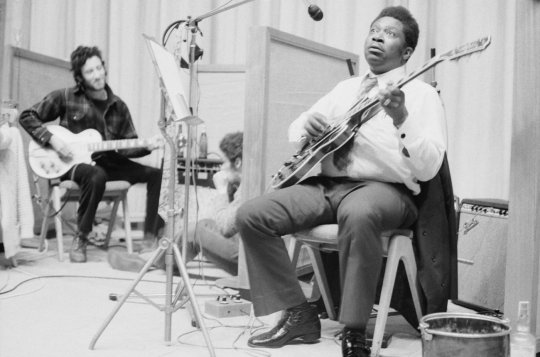
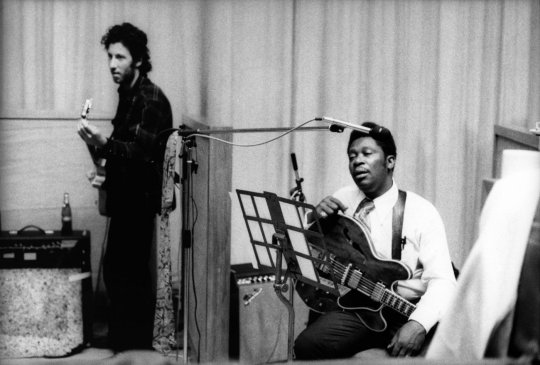
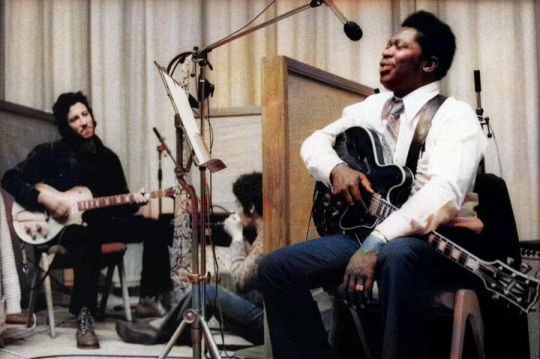
Peter Green and B.B. King in the studio, 1971.
23 notes
·
View notes
Text
ROBO-MATES
In a future where humans utilize, hire, and even befriend machines, an eccentric engineer is looking to find a robot partner of her own. (Her classmates laughed at her back in kindergarten for even the idea- but look at the world now.)
However, her methods for getting a robot love are quite... extreme. She developed a program called Robo Mates, which allowed people to share robots to quote unquote "be paired with their one true match", when in actuality all the robots went to her.
With her being picky however most of the robots ended up killed in the end. And the engineer still ends up with most of the funds.
But two strange events happen: one, she comes across a busted robot in a dumpster who she calls Blue Betty- B.B. for short, and who she thinks is the one after all the failures.
The second strange event? B.B. seems to be in love with the engineer's sane friend, Allison... and much to the Engineer's shagrin, Allison seems to feel the same.
Of course, if she's killed dozens of robots to find her one true love, one measly friend won't stand in the way, either.
Rated TV-14 for violence (and some dialogue).
#artsstoryideas#tv show idea#tv-14#robot#dark comedy#robo-mates#oc the engineer#oc allison#oc b.b.#art's studios#artsstudios#one-off story ideas
11 notes
·
View notes
Text
Metal Arm | B.B.

Warnings: vibranium-arm use, size kink, breeding kink, oral (m receiving), dom!Bucky, shy!Bucky, strangers to sex, public tension, smut-heavy.
⊹ ࣪ ˖₊˚⊹⋆ ⊹ ࣪ ˖₊˚⊹⋆ ⊹ ࣪ ˖₊˚⊹⋆ ⊹ ࣪ ˖₊˚⊹⋆ ⊹ ࣪ ˖₊˚⊹⋆ ⊹ ࣪ ˖₊˚⊹⋆ ⊹
You didn’t mean to bump into him—literally.
Your drink splashes onto your shirt and his black t-shirt both as you crash into a broad, immovable chest. You open your mouth to curse at whoever stood in your way like a wall, until your eyes drift up and—
Oh. God.
He’s huge. His eyes are a stormy blue, and his hair is slightly messy. The black shirt he’s wearing stretches across a broad chest, veiny forearms peeking out beneath rolled sleeves. A leather glove covers his left hand—no, not leather, vibranium.
Your lips part. He stares at you.
“Shit,” you whisper, barely audible.
“You alright?” he asks, voice rough, low, dangerous.
You nod, too fast. “Y-Yeah. Sorry.”
He looks you up and down—slowly, deliberately. His eyes stall at your soaked chest, nipples faintly visible beneath the thin fabric of your white top. You cross your arms instinctively.
“You sure you’re okay?” he asks again, but his tone shifts. Darker. Curious. Amused.
“I’m… fine.” You pause. “You’re Bucky Barnes.”
His brow arches. “That obvious?”
You flush, fidgeting under his intense gaze. You can’t help it—your eyes trail to the arm. That sleek vibranium arm glinting beneath the café lights, fingers curling idly like it wants to do something.
You glance up quickly.
He noticed.
“Like what you see?” he murmurs.
You swallow. “Maybe.”
Something in him clicks. His jaw tightens. He glances around the café, then back at you. You’re too cute. Too small. Looking up at him like he’s some dark fantasy come to life.
“You’re not from around here, are you?” he asks, stepping just a little closer.
You shake your head. “Visiting.”
“Alone?”
“Yeah.”
His voice drops. “That’s dangerous, doll.”
You grin, despite yourself. “You dangerous?”
His mouth twitches, like he’s fighting a smile.
“Come upstairs with me.”
Your breath catches. “What?”
He nods toward the private loft above the café. “One of the baristas is a friend. Keeps a studio for breaks. No one’ll come up.”
You hesitate. One beat. Two.
Then— “Okay.”
The second the door shuts behind you, you’re against the wall. Your back hits it with a soft thud as Bucky’s body crowds yours. His metal hand pins your wrist up, holding it with a gentle but absolute grip.
You moan—quiet, desperate—at the sheer coldness of the vibranium on your skin.
“You like that?” he murmurs, lips brushing your ear.
“I—yeah. Fuck. Yes.”
He chuckles, dark and husky. “You’re gonna make me lose my fuckin’ mind.”
His flesh hand grabs your jaw, tilting your head. He kisses you—roughly, hungrily. His tongue sweeps into your mouth with ease, claiming, possessive. His thigh presses between your legs and you grind down on it without shame.
“Fuck, you’re so small,” he mutters against your lips. “I could break you.”
You whimper. “Please do.”
That does it.
He pulls you to the couch in two strides, lifting you by your waist like you weigh nothing and dropping you onto his lap. You straddle him, heart pounding, legs trembling from adrenaline.
His gloved hand cups your ass while the vibranium slides up your spine. You gasp, arching like it’s burning through your skin. He rips the soaked shirt from your body like paper.
“Jesus,” he breathes, eyes locked on your tits. “So fuckin’ perfect.”
He kisses down your chest, trailing his tongue between your breasts, then up your throat as his hands explore every inch of you. When you reach down to rub him through his pants, you feel him—huge, rock hard, barely restrained.
“I want to taste you,” you whisper, eyes wide.
He pauses. Smirks.
“Oh, you do?”
You nod frantically.
He leans back, spreads his legs. “On your knees, then. Show me how bad you want it.”
You sink down. His cock springs free from his jeans—long, thick, flushed. You wrap your fingers around it, just to feel the heft.
“Bigger than you thought?” he teases, breath ragged.
You nod again, tongue darting out to lick the head. He groans the second you wrap your lips around him.
“Fuuuck, that mouth—”
You take him slow, letting your saliva coat him. One hand pumps what your mouth can’t reach. His vibranium hand finds the back of your head and presses—just enough pressure to hint at how easily he could use it.
You moan around him.
“You’re drooling, doll. Shit. Such a messy little thing.”
You gag when he pushes deeper. You don’t stop.
He groans, hips twitching, the hand on your head tensing. You glance up—tears in your eyes, mouth full—and he almost loses it right there.
“Fuck, I gotta be inside you.”
You blink, dazed. “Then do it.”
He bends you over the couch, rips your panties clean off—literally tears the seams with the vibranium fingers.
You gasp, turning to look at him.
He groans. “You’re soaked. Shit.”
You nod, face down, ass up. “Please, Bucky.”
He runs the head through your folds slowly, teasing. You’re so tiny compared to him, your slick already dripping.
“Gonna ruin you, doll,” he whispers.
And then he pushes in.
You scream into the cushion, overwhelmed. He’s thick. Stretching you wide. His hands—one warm and strong, the other cold and unyielding—grip your hips and thrust.
You take it like you were meant to.
“Fuck—you’re tight,” he pants. “So fuckin’ tight.”
“Keep going, please—Bucky, more—”
He slams into you harder, faster. The arm clamps around your waist, holding you flush to him, and you cry out. Every thrust punches a moan out of your throat. Your fingers clutch the couch for dear life.
“Gonna fill you up,” he growls. “Gonna pump you full of me. Make this pretty pussy mine.”
You shiver.
“Yes—Bucky—breed me—”
That snaps something in him.
He grips your neck, tilts your head. His mouth crashes to yours, sloppy and possessive.
“Say it again,” he demands.
“Want you to breed me. Want your cum in me. Wanna be full of it.”
He fucks you deeper. You’re trembling, the pressure curling in your belly, building to a blinding high.
“I’m gonna—fuck, Bucky—”
“Come for me. Now.”
You explode. Your walls clamp around him as you cry out, legs shaking.
He groans, teeth gritted, and follows a second later—filling you up so deep, so much, it leaks around his cock even as he stays inside.
He doesn’t pull out. He stays. Lets it settle inside you.
“Perfect fuckin’ fit,” he whispers, kissing your shoulder.
Later, when you’re curled in his arms, still impaled on his softening length, he brushes hair from your face.
“You always pick up assassins in cafés?” he teases.
“Only the ones with metal arms.”
He chuckles. “You’re trouble.”
You smile sheepishly.
“So fuckin’ glad I found you.”
⊹ ࣪ ˖₊˚⊹⋆ ⊹ ࣪ ˖₊˚⊹⋆ ⊹ ࣪ ˖₊˚⊹⋆ ⊹ ࣪ ˖₊˚⊹⋆ ⊹ ࣪ ˖₊˚⊹⋆ ⊹ ࣪ ˖₊˚⊹⋆ ⊹
📝 Author's Note:
A QUICK ONE BECAUSE IVE JUST BEEN BINGE WATCHING BUCKY IN ALL MARVEL MOVIES/SHOWS AAAAAAARHGHHHHH THAT MAN
#bucky barnes#bucky x reader#james buchanan barnes#marvel mcu#avengers#bucky x you#the winter soldier#bucky barnes smut#sebastian stan
227 notes
·
View notes
Note
Could you do Benedict Bridgerton with wife reader? Benedict was stressing about something and playing with his hair to calm them down. Leaving kisses everywhere. You decide how it goes. Fluff and maybe a little suggestive. Thanks!! :))
superman b.b
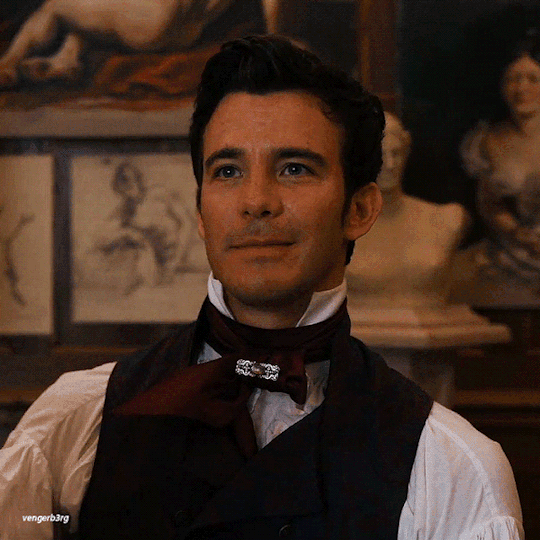
benedict bridgerton x fem! reader
synopsis; benedict bridgerton, stressed by his artistic pursuits, finds comfort in his wife Y/N's loving support. through tender moments and playful interactions, they reaffirm their deep love, showing how they face life's challenges together.
word count; 2.1k
master list
a/n; this is the benedict fic i had originally planned for labyrinth HAHA i tried my best to fulfill annons request but im not too proud of this one APOLOGIES, it just seems a little black and white to me buttt its still cute icl
as always, kinda proof read, kinda not :p
Tall, dark and beautiful
He's complicated, he's irrational
But I hope someday you take me away and save the day, yeah
Benedict Bridgerton sat at his desk, his brow furrowed in deep concentration. Papers were scattered across the surface, a testament to the hours he had spent trying to make sense of his latest artistic endeavor. His studio, usually a place of inspiration and creativity, felt suffocating tonight. The weight of his expectations pressed heavily on his shoulders, and he couldn't shake the feeling of frustration that gnawed at him.
Y/N, his beloved wife, watched him from the doorway. She could see the tension in his posture, the way his fingers gripped the pen a little too tightly, and the sighs of exasperation that escaped his lips. It pained her to see him like this, so she decided to intervene.
Silently, she walked over to him, her soft footsteps barely making a sound on the wooden floor. She placed her hands gently on his shoulders, feeling the knots of tension beneath her fingers. Benedict started at the unexpected touch, but relaxed slightly when he realized it was Y/N.
"Hey," she whispered softly, her breath warm against his ear. "You've been at this for hours. Why don't you take a break?"
Benedict sighed, leaning back into her touch. "I can't seem to get it right, Y/N. Every stroke feels wrong, every idea seems flat. It's maddening."
Y/N pressed a tender kiss to his temple. "Sometimes, taking a step back can give you a new perspective. Let me help you unwind."
Without waiting for a response, she guided him away from the desk and over to the plush armchair by the window. Benedict sat down heavily, the tension still radiating from his body. Y/N knelt beside him, her fingers threading through his hair with a gentle, soothing motion.
"Close your eyes," she murmured, her voice a balm to his frazzled nerves. "Just focus on my touch."
Benedict obeyed, his eyes fluttering shut as he surrendered to the sensation of her fingers massaging his scalp. Y/N's touch was like magic, each stroke easing the tension from his mind and body. She leaned in, pressing soft kisses to his forehead, his cheeks, the corners of his mouth.
"You're so talented, Benedict," she whispered between kisses. "Don't be so hard on yourself."
Her words were a gentle reminder of her unwavering belief in him, and it brought a small smile to his lips. He reached up, capturing her hand in his, bringing it to his lips to press a kiss to her knuckles.
"You always know how to calm me," he said, his voice a mixture of gratitude and affection.
Y/N smiled, continuing her gentle ministrations. "It's because I love you, and I believe in you. You don't have to carry the weight of the world on your shoulders alone."
Benedict's heart swelled with emotion. He opened his eyes, gazing at her with a tenderness that spoke volumes. "I don't know what I'd do without you, Y/N."
"You'll never have to find out," she replied, her eyes sparkling with love.
She leaned in, capturing his lips in a slow, lingering kiss. It was a kiss filled with reassurance and promise, a reminder that she was there for him, always. Benedict's hands found their way to her waist, pulling her closer as he deepened the kiss, pouring all his gratitude and love into the embrace.
When they finally pulled away, breathless and flushed, Y/N rested her forehead against his. "Feeling better?" she asked softly.
Benedict nodded, a genuine smile curving his lips. "Much better. Thank you, my love."
"Anytime," she replied, kissing the tip of his nose. "Now, how about we take a walk outside? A little fresh air might do you some good."
Something in his deep brown eyes has me singing
He's not all bad like his reputation
And I can't hear one single word they said
And you leave, got places to be and I'll be okay
He agreed, and together they stepped out into the cool night air. The stars above twinkled like a promise of better things to come. With Y/N by his side, Benedict felt a renewed sense of hope and inspiration. He knew that no matter the challenges he faced, he would always have her love and support to see him through.
They strolled through the gardens, the moon casting a silver glow on the path ahead. Benedict felt the tension continue to melt away with each step, Y/N's presence grounding him in a way nothing else could. They walked in comfortable silence, simply enjoying each other's company.
"I can't imagine doing this without you," Benedict said after a while, his voice thoughtful. "You always know how to bring me back to myself."
Y/N smiled, squeezing his hand. "That's because I know you better than anyone. And I believe in you more than anyone else."
Benedict stopped walking and turned to face her, his eyes shining with emotion. "You mean everything to me, Y/N. I don't say it enough, but I love you more than words can express."
Y/N felt her heart swell with happiness. She reached up, cupping his face in her hands. "I love you too, Benedict. More than anything."
Their lips met in a tender kiss, the world around them fading away. In that moment, it was just the two of them, wrapped in the warmth of their love.
I always forget to tell you I love you
I loved you from the very first day
The next morning, Y/N woke up to find Benedict already out of bed. She stretched and yawned, a smile spreading across her face as she remembered the events of the previous night. She got up and went to find him, curious to see what he was up to.
She found him back in his studio, but this time the air was different. The frustration and tension were gone, replaced by a sense of calm determination. Benedict was working on a new piece, his strokes confident and sure.
Y/N watched him for a moment, admiring the way his focus had returned. She walked over to him and placed a hand on his shoulder, making him look up with a smile.
"Good morning," she said, leaning down to kiss him. "You're up early."
"I couldn't sleep," Benedict admitted, his eyes bright with excitement. "I had this idea and I just had to get it down."
Y/N looked at the canvas, seeing the beginnings of a beautiful painting. "It's wonderful, Benedict. I'm so glad you found your inspiration again."
"Thanks to you," he said, pulling her into his lap. "You're my muse, Y/N. I don't know what I'd do without you."
Y/N laughed, wrapping her arms around his neck. "I'm just glad I could help. But remember, you have that talent and drive within you. You just need to believe in yourself."
"I do," Benedict said, his voice filled with conviction. "Because you believe in me."
They shared a kiss, the bond between them stronger than ever. Benedict knew that no matter what challenges lay ahead, he would always have Y/N by his side, supporting and loving him. And that made all the difference.
I watch superman fly away
You've got a busy day today
Go save the world I'll be around
Later that day, Benedict and Y/N decided to take a break from their respective pursuits and spend some quality time together. They packed a picnic basket and headed to their favorite spot in the countryside, a secluded meadow surrounded by wildflowers.
As they spread out a blanket and settled down, Benedict couldn't help but feel grateful for this moment. The stresses of the world seemed so far away, and he cherished the simple pleasure of being with the woman he loved.
They ate, laughed, and talked about everything and nothing, enjoying the rare opportunity to relax and just be. Benedict loved the way Y/N's eyes sparkled when she laughed, the way her hair caught the sunlight, and the sound of her voice.
After they finished eating, Y/N lay back on the blanket, looking up at the sky. Benedict joined her, propping himself up on one elbow to gaze down at her.
"Do you ever think about the future?" he asked, his voice soft.
Y/N turned her head to look at him, her expression thoughtful. "I do. I think about our future a lot. I imagine us growing old together, still as in love as we are now. Maybe even more."
Benedict smiled, reaching out to brush a strand of hair from her face. "I like that vision. It sounds perfect."
Y/N took his hand in hers, squeezing it gently. "Whatever the future holds, as long as we're together, I know it'll be wonderful."
Benedict leaned down to kiss her, a slow, sweet kiss that conveyed all the love he felt for her. "You make everything better, Y/N. I can't wait to spend the rest of my life with you."
They lay there for a while longer, basking in the warmth of the sun and the comfort of each other's presence. Benedict felt a sense of peace settle over him, a certainty that no matter what challenges came their way, they would face them together.
Later that evening, as the sun dipped below the horizon, casting a warm, golden glow over their home, Benedict and Y/N prepared for bed. The evening had been perfect, filled with laughter and love, and Benedict couldn’t help but feel a sense of contentment. He watched Y/N as she brushed her hair, her movements graceful and serene. The sight of her brought a soft smile to his lips.
Benedict walked up behind her, wrapping his arms around her waist and pressing a tender kiss to her neck. “You’re beautiful,” he murmured against her skin.
And I watch superman fly away
Come back, I'll be with you someday
I'll be right here on the ground
When you come back down
Y/N chuckled softly, leaning back into his embrace. “Flattery will get you everywhere, my dear husband.”
He smiled, nuzzling her neck affectionately. “I’m just stating the truth. You make everything seem brighter.”
Y/N turned in his arms, her eyes meeting his with a mixture of love and amusement. “And you, Benedict Bridgerton, have a way of making me feel cherished.”
He brushed a stray strand of hair from her face, his fingers lingering on her cheek. “That’s because you are cherished, Y/N. More than you know.”
She reached up, cupping his face in her hands. “I know it because you show me every day. In the little things, the big things, and everything in between.”
Benedict leaned in, capturing her lips in a slow, tender kiss. The world outside their embrace ceased to exist, and all that mattered was the love they shared. When they finally pulled away, he rested his forehead against hers, his breath mingling with hers.
“You make me a better man,” he said softly. “With you, I feel like I can conquer anything.”
Y/N smiled, her eyes shimmering with emotion. “And with you, I feel truly loved and supported. Together, we can face anything.”
And I watch you fly around the world
And I hope you don't save some other girl
Don't forget, don't forget about me
They climbed into bed, the weight of the day lifting as they held each other close. The room was filled with a peaceful silence, broken only by the sound of their breathing. Benedict’s hand found its way to Y/N’s hair, his fingers gently threading through the soft strands.
“Do you remember the first time we met?” he asked, his voice a whisper in the quiet room.
Y/N smiled, her eyes closing as she recalled the memory. “How could I forget? You were so serious, trying to hide your curiosity behind that stoic expression.”
Benedict laughed softly. “And you were the one who made me laugh, breaking through my defences with your wit and charm.”
“I knew then that you were someone special,” Y/N said, her voice filled with affection. “And look at us now, married and happier than I ever imagined.”
He kissed her forehead, his heart swelling with love. “I’m grateful for every moment with you, Y/N. You bring so much joy into my life.”
I'm far away but I'll never let you go
I'm lovestruck and looking out the window
They lay there, wrapped in each other’s arms, sharing quiet conversation and soft laughter. The connection between them was undeniable, a bond that grew stronger with each passing day. Benedict knew that no matter what challenges they faced, they would always have this—this love, this partnership, this unwavering support.
As they drifted off to sleep, Benedict felt a profound sense of peace. He knew that with Y/N by his side, he could face anything. And that made all the difference.
Don't forget, don't forget where I'll be
Right here
a/npt2; please let me know how you felt about this! im still getting the hang of writing the bridgerton boys but i do my best!
#benedict bridgerton x reader#bridgerton x reader#imagine#fanfiction#fanfic#fic#bridgerton#bridgerton s1#bridgerton imagine#bridgerton fic#bridgerton fanfic#bridgerton fanfiction#anthony bridgerton#benedict bridgerton#colin bridgerton#daphne bridgerton#eloise bridgerton#francesca bridgerton#gregory bridgerton#hyacinth bridgerton#violet bridgerton#y/n bridgerton#sibling reader#bridgerton brothers x you#bridgerton brothers x y/n#bridgerton sisters x you#bridgerton sisters x y/n#bridgerton sisters x reader
234 notes
·
View notes
Text
The Art of Desire// B.B x Reader epilogue
summary: Benedict Bridgerton longs for more than society’s expectations, drawn instead to art and freedom. Y/N, a fiercely talented but struggling artist, fights for recognition in a world that dismisses women of her class. When their paths cross, fascination sparks—a shared passion for art bridging the divide between privilege and survival. But their growing connection threatens them both in a world where reputation is everything. As scandal looms and duty calls, they must choose: conform to society’s rules or risk everything for love, ambition, and the art that brought them together.
word count: 0.9k
Master List

The cottage smelled like toast and turpentine.
Which, by now, meant everything was running exactly as it should.
Ben was under the kitchen table with a set of pencils he’d definitely stolen from his mother’s studio, whispering furiously to a lopsided drawing of a knight. Eloise—LouLou to everyone except Violet and her occasional scolding tone—was standing barefoot on a stool at the stove, wearing an apron twice her size and wielding a wooden spoon like a sword.
“I said stir,” Y/N called from the doorway, one hand on her lower back and the other cradling her rounded stomach. “Not attack.”
“I am stirring,” LouLou replied, her curls bouncing as she whipped the eggs with such violence the cat flinched and fled.
Ben snorted from beneath the table.
Y/N sighed, rubbing her belly. The baby, still stubbornly nameless, was kicking like mad today, likely in protest of the noise.
“I was going to let Papa sleep in,” she muttered, mostly to herself.
And as if summoned by some invisible thread, Benedict wandered in from the hallway, half-dressed and half-asleep, hair tousled like a storm cloud and shirt buttoned all wrong.
“I was sleeping in,” he said, yawning as he kissed her cheek. “And then someone started duelling the eggs.”
“That’s your daughter,” Y/N said, gesturing vaguely toward the stove.
He glanced over. “No one’s on fire. I call that progress.”
Y/N smiled, leaning against him. “You’re lucky I love you.”
“Oh, I know.”
Ben crawled out from under the table, smudged with graphite and mystery, and launched himself into Benedict’s legs.
“You promised we could go to the pond today,” he said with wide eyes and a tone that suggested betrayal and pending litigation.
Benedict scooped him up with one arm, still clinging to Y/N with the other. “We are. After breakfast. Assuming no one burns the cottage down first.”
“I said I was stirring!” LouLou yelled again, brandishing the spoon.
Benedict raised an eyebrow. “Remind me, did she inherit your stubbornness or mine?”
“Both,” Y/N said flatly.
They kissed through the smell of eggs, the sound of wooden clatter, the rustle of soft child feet and the clank of dropped spoons.
And through it all—chaos, laughter, flour dust in the air—there was that quiet, tender stillness that lived in the bones of this place. Their place.
It hadn’t always been easy. There had been years when Y/N still braced herself at doorways, waiting for love to be taken away. Years where Benedict had learned how to hold without fixing, how to support without smothering. But somewhere between muddy boots and shared sunrises, they had built a life full of room for growth, for mess, for them.
They’d been in the cottage nearly eight years now. The garden was wild with late spring bloom. Paintings lined every wall. One of Benedict’s waistcoats lived permanently draped over the banister. And LouLou had just given Fig the cat a bonnet and declared her queen of the hearth.
It was, objectively, a disaster.
But it was theirs.
Y/N lowered herself into a chair with a groan, one hand pressing to the swell of her belly.
Benedict joined her a moment later, Ben sprawled across his lap like a very determined puppy.
“She’s kicking again,” Y/N said, grimacing softly.
“She?”
“Don’t start.”
He leaned over and pressed a kiss to her temple, then her cheek, then her shoulder. “You’re glowing.”
“I’m sweating.”
“You’re radiant.”
“I’m leaking, Benedict.”
“I’ve never been more in love.”
Ben made a gagging noise.
“Alright,” Benedict said, setting him down. “Go help your sister plate the breakfast.”
“She won’t let me!”
“Negotiate,” Benedict said.
“I tried!”
“Then bribe her.”
Ben ran off yelling, “LOULOU, I HAVE A BARGAIN FOR YOU.”
Y/N covered her face with her hands and laughed into her palms. “We’re raising diplomats.”
“We’re raising future revolutionaries,” Benedict said fondly. “And if that terrifies you now, just wait until they’re out in society.”
She groaned. “Don’t say things like that.”
He chuckled, brushing a hand along the curve of her belly. “Any more thoughts on names?”
“I told you. If it’s a girl, we'll name her after your mother.”
“She’d cry.”
“She will cry.”
“And if it’s a boy?”
Y/N arched a brow. “Not Colin.”
“I was never going to suggest Colin.”
A beat.
“Okay, I briefly considered it.”
She reached over and flicked his forehead.
LouLou proudly stomped over with a plate of eggs and toast, setting it down in front of Y/N with a flourish. “I cooked!”
“I supervised,” Ben added, sliding into the bench beside her.
Y/N smiled. “Then I’m sure it’ll be perfect.”
They all sat down together—messy, flushed, barefoot and full of crumbs.
And as the morning sun spilled through the windows, catching the edges of paintings and tangled curls and toast crumbs, Y/N caught Benedict looking at her the same way he always had.
Like she was his best idea.
Like she was the beginning of everything good.
She reached across the table, took his hand, and squeezed it.
“Thank you,” she whispered.
“For what?”
“For finding me. For staying. For… all of it.”
He lifted her hand to his lips. “I’d do it again. A thousand times.”
LouLou shoved a forkful of egg into her mouth, then looked at them suspiciously.
“Are you being mushy again?”
Y/N grinned. “Terribly.”
Ben scowled. “Does this mean no pond?”
Benedict laughed, already rising from the bench. “This means immediate pond.”
And with that, the morning unfolded—into giggles and spills and someone forgetting their shoes, into splashes and sketches and the promise of a quiet nap later on, curled up beneath sun-warmed blankets and the slow, steady beat of a life fully lived.
#bridgerton#benedict bridgerton#benedict bridgerton x reader#bridgerton fanfiction#bridgerton fic#bridgerton x reader#slow burn romance#forbidden love#class divide
51 notes
·
View notes
Text

War - Low Rider (1974) B.B. Dickerson / Charles Miller / Harold Brown / Howard Scott / Lee Oskar / Lonnie Jordan / Papa Dee Allen / Jerry Goldstein from: "Why Can't We Be Friends?" (LP) "Low Rider" / "So" (Single)
Funk | Jazz Fusion | Latin Rock
Tumblr (left click = play) (320kbps)
JukeHostUK (left click = play) (320kbps)
Personnel: Charles Miller: Vocals / Alto Saxophone Lonnie Jordan: Keyboards Lee Oskar: Harmonica Howard E. Scott: Guitar B. B. Dickerson: Bass Thomas "Papa Dee" Allen: Cowbell / Congas / Percussion Harold Ray Brown: Drums
Produced by Lonnie Jordan / Howard E. Scott / Jerry Goldstein
Recorded: @ The Sound City Studios, Studio B in Van Nuys, California USA during 1974
Album Released: June 1975 Single Released: August 1975 United Artists Records
21 notes
·
View notes
Text
April 7, 1968
New York, NY
Three days after the assassination of Dr. Martin Luther King, B.B. King, Joni Mitchell, Janis Joplin/BBHC, the Paul Butterfield Blues Band, Richie Havens, Buddy Guy, and Jimi Hendrix held a musical wake at the Generation Club in Greenwich Village. It was the last show at the shortlived club.
Hendrix later purchased the building and converted it into Electric Lady Studios, one of the many stops on the FREE Trips 'n' Tunes Greenwich Village Trip.

#Jimi Hendrix#richie havens#Janis Joplin#Big brother and the holding company#classic rock#rock#hard rock#rock and roll#heavy metal#'60s#Martin Luther King#bb king
25 notes
·
View notes
Text
blast man yapfest
this is fun to do
this will be just as disorganized as the other one lol.. iuuuuuhhhh
Blast Man is a 5’7 Robot Master manufactured by B.B. Bomb Company for pyrotechnics and demolition. Movie studios, theme parks, and the like are usually in demand of this kind of expertise, especially of a robot purpose-built for it, so he lives a somewhat transient life, being leased out to different studios. He is currently at the Flower Land theme park, on lease, for design work and maybe a little demolition.
Blast Man absolutely LOVES movies. He loves TV shows, music, games, sculptures, literally any form of art or media you can think of. This perfectly lines up with getting to work at movie studios and theme parks, regardless of his gripes with it. He is entranced in the movie making process, every single part of it, to casting, storyboards, writing- everything. His favorite is of course the practical effects. He really favors movies from before CGI became more common. He has an insane collection of VHS tapes, DVDs, CDs, cartridges and records for all sorts of things, with the media players to go with them.
Blast Man is very rebellious in nature. He does not get along that well with his manufacturer and some theme park staff. BBBC treats him as a tool or equipment, and of course, he doesn’t like that. Blast has developed attention-seeking behavior and low self preservation because of this. He has gotten into so much trouble due to that, at times into physical altercations. He is slowly getting out of this phase in modern times, but he will forever be loud-mouthed and argumentative with other people, especially if you annoy him personally. He is a goddamn brat, he is petty, nosy, and childish.
Besides his behavioral issues, if you can sit him down with his favorite subjects, he will leave you alone. His knowledge with explosives is immense. He can very easily calculate what an explosive devices need in it, how much of this and that is needed for the actual explosive material itself, the best way to detonate it, and how to fine-tune the blast yield. He is very good at improvising it too. By extension he has a lot of chemistry and practical engineering knowledge. He does like to take things apart and put them back together again.
My favorite headcanon is that hes a transgender man. Just like me fr. It was probably a quick realization, a couple months to a year max after he was first brought online. Manufacturer was hesitant to do anything about it but eventually gave in, thankfully, and now he is very happy with himself and his body. I dont know how or why a robot would have top scars but he does just trust me okay. Ill add hes bisexual too
Blast Mans home is fun. The theme park he is leased to also doesn’t hold him in high regards, so he was regulated to a storage room in a warehouse in the back of the park. Its a small room, no air, water, and a couple outlets. In time he has made this room insanely homey. I see it with fairy lights, a big bed in the corner with tons of bedding and pillows, a kitchenette in the corner across, an old couch in the middle, and the opposite wall is nothing but shelves holding his media collection. An entertainment center is a must; big CRT with a half dozen game systems plugged into it and streaming services. It is messy in there but its nice. The limitations do have him having to use a few park facilities when he needs it however. Almost everything in there is secondhand and thrifted.
Elaborating on his work and a ‘transient’ life; BBBC leases Blast Man out to studios out of town, region, and country. He travels a lot, which he does really like, with the occasional homesickness. The studios are usually movie studios, for a few weeks at a time. On occasion he is leased out for over a month. The company does provide for him, for travel expenses and hotel rooms, but everything else is left to him. His biggest dream ever is to travel to Hollywood and get to help on set for a historical movie. Alternatively, his second biggest dream would be a year-long car trip across the country.
The recent release of Timelines #1 really reinforced some stuff I already thought of for Blast Man. Being reckless and uncontrollable, improvisational, literally (kind of) called childish, and the utter refusal of going down. The way he talks is literally perfect. He even slurs his words (i.e. “somethin’”) exactly like I thought he would. He is literally insane and he is so perfect and I love him so much.
Stuff that doesnt fit in:
Blast works REALLY well with kids. The loudest most obnoxious guy you know can easily calm down a crying kid.
With the practical effects stuff hes probably knowledgable on prosthetics and the like, he can do your makeup and it would be fucking amazing
He gets along really well with the other Elevenths, mostly. Tundra Man is his bestest friend ever and they have the dynamic of “”popular girls”” at school who are bitches and gossip about everybody. they are so funny to me, they bounce off eachother really well, all time bromance imo. Tundra also acted like a wingman for him when it came to Fuse
Blast is really heavy but only because he has very thick, dual-layered armor and extra support in his frame because.. explosions. Inevitably he will get in the middle of his own blasts.
Cannot cook. Robots dont really need to eat but he likes to and he like exclusively eats doordash and whatever he can cook in a microwave
His favorite animal is a cat. I think he has a very treasured cat plushie….
Purely projection but his favorite game series is Pokemon. He has Pokemon plushes in his bed and he loves them very much. His favorite is Blaziken or Blacephalon
ADHD and autistic.
He has, maybe, possibly, probably JUUUUST once, demolished a building for fun. Maybe a theme park ride too.
He really likes to impress people and perform for them. He is a dramatic showman at heart no matter what
I see a lot of people hc blast as like hispanic or generally latino which i gotta mention is fucking awesome. My interpretation hes just blasian lol
As homey as his ‘home’ is i think he likes spending time at Fuse Mans home more. A proper bathroom and kitchen and actually good furniture goes a long way. Sorry the blastfuse is inevitable
Speaking of, he absolutely decided to persue Fuse Man. Seeing some guy whos clearly in need of literally anybody in his life he just had to, cue developing a crush and eventually confessing offhandedly one day. YAY!!!!!!!
His ideal date is a movie night and probably nothing else. Just so he can tell someone about every single effect in the movie and how nd why they work
this isnt rlly a hc but i wanna add i project onto blast man sodoso much i love him so much he is so me
8 notes
·
View notes
Note
I love your Bella x Bugs ship! 😆🥰 can we get more info and headcanons about this ship please?
Thank you!! 🥺
I did write some stuff for how they met and their overall dynamic with each other here.
But I can definitely give some headcanons and little bit of more details about them! :3 These will mostly be for the Toon Actor AU.
🥕 Before dating, Bugs would constantly try to get directors and writers to add Bella into his episodes to either have a guest appearance or costar with him, saying it was mostly to help her get more experience, but in reality it was because he would find himself laughing more behind the scenes with her around.
🍯 While on set most of the time, Bella would follow Bugs around due to being shy and not very familiar with others and how everything works at the studio.
🥕 Bugs once caught himself getting distracted by Bella on set one day, ending up falling off a high platform and crashing below. Which resulted to a lot of talk around the studio because of it.
🍯 Before they got together, Bella would constantly compare herself to Bugs’ exes, dealing with a lot of self hatred at the time and feeling like she wasn’t perfect enough to even like him.
🥕 The moment Bugs realized he had a crush on Bella, he struggled with denial for a while, which became worse the moment Daffy found out and starts to tease him endlessly about it as payback.
🍯 Even though Bella hates dressing up, she’ll gladly watch Bugs try on outfits all day, going as far as to point out which colors go better on him due to her being an artist.
🥕 When he gets days off from filming, Bugs will spend them mostly taking naps with Bella, clinging to her as if she’s a giant teddy bear.
🍯 Bella spoils Bugs with bake goods, constantly showering him in sweets.
🥕 Bugs on the other hand will find himself writing sonnets and songs obsessively for her, spending a lot of sleepless nights to make them perfect for Bella.
🍯 Eventually when the pair decides to live together, they had the hardest time trying to figure out what belonged to each other at first since they both had “B.B.” written on a lot of their stuff for their initials.
#I wanted to write more but I’m drawing a blank now lol#💌 letters 💌#anonymous#❤️ of course you realize this means love ❤️
35 notes
·
View notes
Photo

Digimon World 4 (B.B. Studio / Bandai - PS2 / GC / XBOX - 2005)
#Digimon World 4#B.B. Studio#Bandai#PS2#GameCube#XBOX#PlayStation 2#cyberspace#digimon#digimon world#digimon series#Y2K gaming#Y2K
82 notes
·
View notes
Text
Mobile Suit Gundam SEED: Battle Destiny Remastered announced for Switch, PC - Gematsu

Publisher Bandai Namco and developer B.B. Studio have announced Mobile Suit Gundam SEED: Battle Destiny Remastered for Switch and PC (Steam). It will launch on May 22 worldwide.
Mobile Suit Gundam Seed: Battle Destiny Remastered is a remastered version of the PS Vita game Mobile Suit Gundam SEED: Battle Destiny, which was released only in Japan on June 7, 2012.
Here is an overview of the game, via Bandai Namco:
About
Become a pilot in the world of Mobile Suit Gundam SEED, for the first time available with English localization! Engage in thrilling, action-packed Gundam battles, complete missions, and tune up your newly acquired Mobile Suits!
Key Features
Battle Across Turbulent Times! – Relive legendary moments from Mobile Suit Gundam SEED and Mobile Suit Gundam SEED Destiny with enhanced maps and graphics. Choose your faction from Earth Alliance Forces, ZAFT, or the Archangel, and complete missions alongside familiar pilots and Mobile Suits from the series.
Over 100 Mobile Suits! – All Mobile Suits have been redesigned with high-resolution model textures. Unlock more Mobile Suits and missions from the main Mobile Suit Gundam SEED series, and battle into additional side stories from the Mobile Suit Gundam SEED universe.
Tune Up Your Suits! – Strengthen your suits and weaponry in the redesigned UI menu. Tune your suits to match your playstyle as you embark on missions and take on stronger opponents!
System Enhancements – New lock-on modes and controller settings have been added for smoother gameplay.
*Product is based on Mobile Suit Gundam SEED: Battle Destiny released in 2012. Some specifications may differ.
Watch the announcement trailer below. View the first screenshots at the gallery.
Announce Trailer
English
youtube
Japanese
youtube
#Mobile Suit Gundam SEED: Battle Destiny Remastered#Mobile Suit Gundam SEED: Battle Destiny#Mobile Suit Gundam SEED Destiny#Mobile Suit Gundam SEED#Mobile Suit Gundam#Gundam SEED#Gundam#Bandai Namco#B.B. Studio#Gematsu#Youtube
4 notes
·
View notes
Text
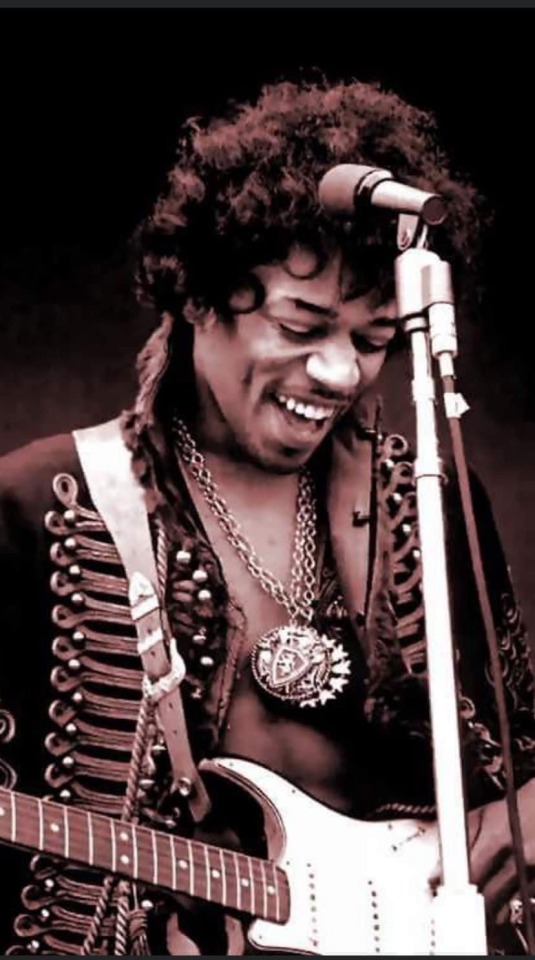
Let's remember one of the Greatest Guitarist ever, Jimi Hendrix on the date of his birth.
Jimi Hendrix signature James Marshall "Jimi" Hendrix (born Johnny Allen Hendrix; November 27, 1942 – September 18, 1970) was an American guitarist and singer-songwriter. He is widely considered to be the greatest guitarist in musical history, and one of the most influential musicians of his era across a range of genres.
After initial success in Europe with his group The Jimi Hendrix Experience, he achieved fame in the United States following his 1967 performance at the Monterey Pop Festival. Later, Hendrix headlined the iconic 1969 Woodstock Festival and the 1970 Isle of Wight Festival. He often favored raw overdriven amplifiers with high gain and treble and helped develop the previously undesirable technique of guitar amplifier feedback.
Hendrix, as well as his friend Eric Clapton, popularized use of the wah-wah pedal in mainstream rock which he often used to deliver an exaggerated sense of pitch in his solos, particularly with high bends, complex guitar playing, and use of legato. As a record producer, Hendrix also broke new ground in using the recording studio as an extension of his musical ideas. He was one of the first to experiment with stereophonic phasing effects for rock recording.
Hendrix was influenced by blues artists such as B.B. King, Muddy Waters, Howlin' Wolf, Albert King and Elmore James, rhythm and blues and soul guitarists Curtis Mayfield and Steve Cropper, and the jazz guitarist Wes Montgomery. Hendrix (who was then known as 'Maurice James') began dressing and wearing a moustache like Little Richard when he performed and recorded in his band from March 1, 1964 through to the spring of 1965. In 1966, Hendrix stated, "I want to do with my guitar what Little Richard does with his voice".
Hendrix won many of the most prestigious rock music awards in his lifetime, and has been posthumously awarded many more, including being inducted into the US Rock and Roll Hall of Fame in 1992 and the UK Music Hall of Fame in 2005. An English Heritage blue plaque was erected in his name on his former residence at Brook Street, London, in September 1997. A star on the Hollywood Walk of Fame (at 6627 Hollywood Blvd.) was dedicated in 1994. In 2006, his debut US album, Are You Experienced, was inducted into the United States National Recording Registry, and Rolling Stone named Hendrix the top guitarist on its list of the 100 greatest guitarists of all-time in 2003.
21 notes
·
View notes
Text
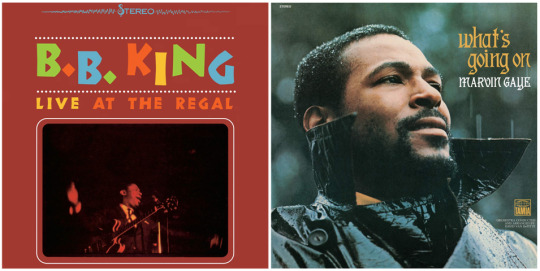
ROUND 1: Live at the Regal vs. What's Going On
B.B. King - Live at the Regal (1965) Genre: Blues Singles: N/A Grammys: N/A RIAA Certification: N/A Rolling Stone Rank: 299
Used as a performance primer by artists like Carlos Santana, John Mayer, and Eric Clapton, legendary singer and guitarist B.B. King's seminal live blues album is universally considered one of the best. A definitive showcase of King's immense talent combined with a top-notch setlist and backing band, Live at the Regal also captures King's electric stage charisma and audience chemistry, cementing the record as essential listening for blues fans and those interested in the roots of modern rock and roll.
*This album is preserved in the National Recording Registry.
Marvin Gaye - What's Going On (1971) Genre: Soul, R&B Singles: What's Going On, Mercy Mercy Me (The Ecology), Inner City Blues (Make Me Wanna Holler), Save the Children Grammys: One nomination RIAA Certification: Gold Rolling Stone Rank: 1
Created after a tumultuous period in his life and a complete image change from the sharp and clean-shaven portrait of his earlier albums, Marvin Gaye's eleventh studio album was spurred by Four Tops member Renaldo Benson, who wrote the title track in response to police brutality and offered it to Gaye. What's Going On is a concept album and song cycle from the point of view of a Vietnam veteran who returns home to see injustice, suffering, and all manner of societal ills; also credited with bringing to light environmental issues before discussion of such was mainstream, the album is nigh-universally considered one of the greatest of all time, enjoying the top spot on many such lists.
*This album is preserved in the National Recording Registry.
5 notes
·
View notes
